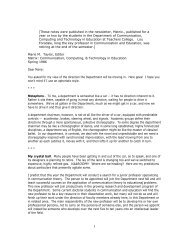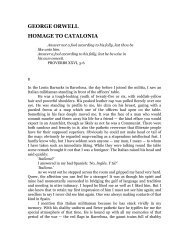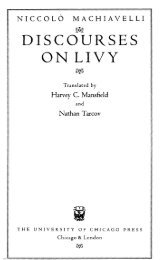THE REPUBLIC OF PLATO - Studyplace
THE REPUBLIC OF PLATO - Studyplace
THE REPUBLIC OF PLATO - Studyplace
You also want an ePaper? Increase the reach of your titles
YUMPU automatically turns print PDFs into web optimized ePapers that Google loves.
12 CHAPTER II [I. 334<br />
grandfather Autolycus by remarking that he surpassed all men in<br />
cheating and perjury. Justice, according to yOll and Homer and<br />
Simonides, turns out to be a form of skill in cheating, provided it<br />
be to help a friend or harm an enemy. That was what you meant<br />
Good God, no, he protested; but I have forgotten now what I<br />
did mean. All the same, I do still believe that justice consists in<br />
helping one's friends and harming one's enemies.<br />
[The argument now becomes more serious. Polemarchus, though<br />
puzzled, clings to the belief that it must be right to help friends<br />
and harm enemies. This was a traditional maxim of Greek morality,<br />
never doubted till Socrates denied it: no one had ever said that<br />
we ought to do good, or even refrain from doing harm, to them<br />
that hate us. Socrates' denial rests on his principle, later adopted<br />
by the Stoics, that the only thing that is good in itself is the goodness,<br />
virtue, well-being of the human soul. The only way really to<br />
injure a man is to make him a worse man. This cannot be the<br />
function of justice.]<br />
Which do you mean by a man's friends and enemies-those<br />
whom he believes to be good honest people and the reverse, or<br />
those who really are, though they may not seem so<br />
Naturally, his loves and hates depend on what he believes.<br />
But don't people often mistake an honest man for a rogue, or :1<br />
rogue for an honest man; in which case they regard good people as<br />
enemies and bad people as friends<br />
No doubt.<br />
But all the same, it will then be right for them to help the rogue<br />
and to injure the good man<br />
Apparently.<br />
And yet a good man is one who is not given to doing wrong.<br />
True.<br />
According to your account, then, it is right to ill-treat a man who<br />
does no wrong.<br />
No, no, Socrates; that can't be sound doctrine.<br />
It must be the wrongdoers, then, that it is right to injure, and<br />
the honest that are to be helped.









